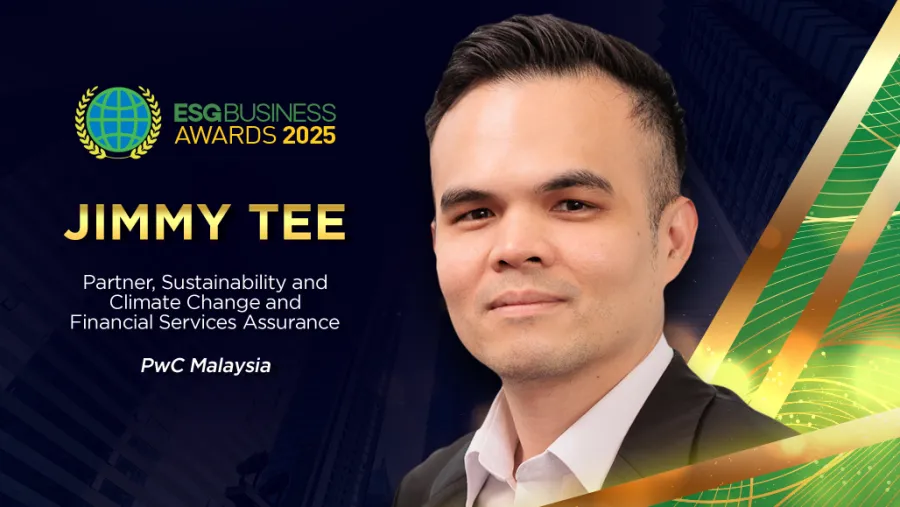
PwC Malaysia's Jimmy Tee champions sustainability through risk and opportunity insight
He highlights the need for leaders to equip their organisations with the right skills and support to navigate the adoption of ESG practices.
As companies in the Asia Pacific strive to embed sustainability into their core operations, many continue to face hurdles related to limited skills and resources, as well as technology gaps. Growing pressure to meet global standards has made it clear that ESG integration must be both strategic and collaborative.
Offering his invaluable insights is Jimmy Tee, Partner, Sustainability and Climate Change and Financial Services Assurance at PwC Malaysia. With over 12 years of experience in the financial services industry, Tee specialises in advising regional banking and insurance clients on climate risk management, sustainable financing, and sustainability reporting and assurance.
He is also involved in assurance services for major banking clients and regularly conducts masterclasses and webinars on key topics such as climate risks and the National Sustainability Reporting Framework (NSRF). In addition to his sustainability work, Jimmy has led regulatory compliance engagements, including the development of Compliance Risk Assessment methodologies, reviews of AML/CFT controls, and implementation of Governance, Risk and Compliance (GRC) solutions.
As a judge at the ESGBusiness Awards 2025, Jimmy discussed the region's evolving sustainability landscape, the common barriers to ESG integration, and the capabilities business leaders must develop to lead with impact.
With your extensive experience in sustainability and climate change, how would you characterise the current state of ESG adoption in Malaysia and the region?
The adoption of sustainability practices is increasingly apparent amongst businesses in Malaysia and the Asia Pacific region. This is predominantly driven by the introduction of new regulations on climate change and sustainability reporting in this region. Most developments centre around the adoption of the IFRS Sustainability Disclosure Standards in this region and the Corporate Sustainability Reporting Directive (CSRD), which impacts businesses with interests in the European Union (EU) as well as those that are trading with the EU.
Widespread climate-friendly investments have been observed, based on the Asia Pacific edition of PwC's 28th Annual Global CEO Survey. 87% Asia Pacific CEOs said they have initiated climate-friendly investments in the last five years.
The challenge remains for businesses to take on a value-based lens in adopting sustainable practices whilst balancing that with the cost of compliance, given the rising regulatory expectations both in the region and globally.
What are the most common challenges that companies face when embedding ESG principles into their operations and decision-making processes?
The current macroeconomic landscape has presented new implications for businesses, accelerating the adoption of sustainability practices. The challenges organisations face in integrating sustainability into the business can be broadly categorised into three areas:
Skills and resources – The topic of sustainability has been around for quite some time, but the agenda continues to evolve over time, demanding a new set of skills in recent years. For example, the recent introduction of globally unified sustainability reporting standards, such as the IFRS Sustainability Disclosure Standards, underscores this shift. Several countries in the region, including Malaysia, have committed to adopting these standards starting in 2025. Beyond developing the necessary capacity and skills to prepare reports, and collecting the appropriate data, the shift to financial quantification and financial grade reporting will increasingly require expertise in financial reporting and collaboration between sustainability teams and finance teams.
Data availability – Due to limited data availability in this region, estimating a company's Scope 3 emissions often involves substantial estimations and judgments. The primary challenge lies in effectively analysing and interpreting the results to support informed business decision-making, as the accuracy of these estimates is often low in some aspects of the estimation. Similarly, the challenges apply to climate scenario analysis. Based on our Sustainability Counts III report in collaboration with the National University of Singapore (NUS), whilst 55% of companies in the Asia Pacific region provided disclosures on climate scenario analysis in 2024, most companies disclosed only qualitative climate scenario analysis. This can be attributed to limitations in data availability around climate impacts, emissions and financial metrics. An integrated approach is critical for effective data collection, enabled by collaboration across functions within the organisation, as well as regular engagement with suppliers, customers and other supply chain partners.
Continuous investments – According to PwC Malaysia’s Corporate Directors Survey 2024, only 21% of surveyed board directors perceive sustainability as an opportunity for value creation, despite frameworks highlighting the need to assess opportunities arising from climate and nature. This perception is often linked to relatively low budget allocations for sustainability initiatives. There is also the tendency to manage sustainability as a compliance-driven requirement, which often results in sustainability being treated as a separate peripheral aspect rather than an integral part of the business strategy.
There is a notable technology gap in managing ESG data, a crucial component of sustainability integration. Only 10% of Malaysian financial professionals surveyed in a 2023 PwC study have ESG data maintained as part of the organisation’s Enterprise Resource Planning (ERP) systems.
Which practices or approaches have you found to be most effective in helping companies embed ESG into their core business models across different industries?
Sustainability issues vary significantly based on the industry in which a company operates. Critically, the case for sustainability needs to be built by understanding the key risks and opportunities that may potentially impact the company and the different parts of its value chain. This allows companies to be able to more effectively allocate investments in the parts which are most exposed to sustainability risks and capture the opportunities that are applicable to them. We see positive indicators of climate investments paying off. As mentioned earlier, 87% of Asia Pacific CEOs polled have initiated climate-friendly investments in the last five years, and 39% reported increased revenue from the investments.
Clear commitment from leadership, including the board of directors and the key stakeholders in the company, is crucial in driving the sustainability agenda within the organisation. Whilst issues like carbon emissions and energy transition are being given attention in boardrooms, more focus is needed in emerging areas such as the circular economy, nature and just transition.
What skills and qualities do you believe are most essential for today’s business leaders to navigate the ESG landscape effectively?
In a world of constant change and evolving expectations, one of the key qualities of today’s business leaders is being able to help the workforce learn to better adapt to change. For sustainability, this includes learning about potential disclosure gaps in TCFD reporting, understanding how to meet the requirements of IFRS and the NSRF, which may include nature considerations as well in the future—an area which corporates will need to prepare for. Business leaders need to provide sufficient training and support the organisation in navigating the challenges of transition. Incentives and grants have been made available by various government agencies and financial institutions to facilitate upskilling investments by small and medium-sized companies, including the procurement of physical training like workshops as well as e-learning.
Looking ahead, what trends or shifts do you expect to reshape how industries approach ESG and sustainable business models?
Investor expectations are becoming more apparent in shaping how industries approach sustainability. In PwC’s Global Investor Survey 2024, nearly a third of investors rate climate change amongst the top threats over the next 12 months to the companies they invest in or cover. Institutional investors in the region are expecting the investees to adopt sustainable practices that manage the key sustainability risks and build on prioritised sustainability-related opportunities into the business models for them to continue with the investments. Investors are also expected to ensure that their investments are not causing detrimental impacts on nature, considering that almost every sector of the Asia Pacific economy is directly dependent on nature, to a varying degree.
In most parts of the region, regulatory requirements will still be one of the main drivers in implementing sustainability initiatives within the organisation. The implementation of globally unified sustainability reporting standards and mandatory assurance in certain countries within the region will shift the focus to driving more integration of sustainability in the business.
In addition, as the ESG agenda moves deeper into climate and broadens into nature, organisations will need more specific capabilities tailored to their evolving needs. Boards may explore the use of external expert panels to tap into deeper capabilities. For companies that may not need a dedicated in-house ESG team, they may look to outsource technical analysis.
As a judge for the ESGBusiness Awards 2025, what key qualities will you be looking for in nominees to assess their leadership and excellence in ESG and sustainable practices?
Innovation – Innovative solutions that demonstrate creativity and push the boundaries in introducing new technologies and ways of working and collaborating in the different areas of sustainability, leading to impact.
Impact – Solutions need to be differentiated, compelling and scalable, demonstrating how nominees are generating the most impact in driving the sustainability agenda forward, with quantifiable outcomes demonstrating clear benefits to the environment, or social or multiplier economic benefits to industries.














